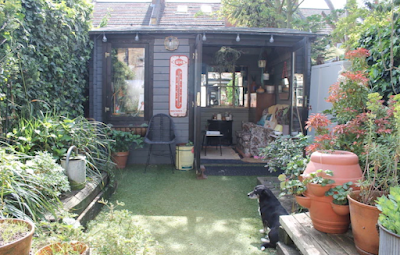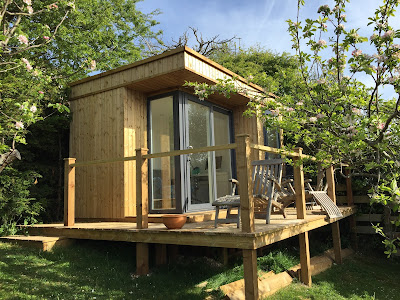A genuinely iconic garden office, the place where novelist Virginia Woolf wrote, as illustrated by James Oses in my latest book Rooms of Their Own. Here's a snippet from her section in the book:
Woolf’s friend Lytton Strachey complained that she surrounded herself with ‘filth packets’ as she wrote, cigarette ends, pen nibs, and various bits of paper. Over her lifetime she also had several tables/desks at which she wrote, including one standing desk. Annie Liebovitz photographed the top of her table in the writing lodge for her book Pilgrimage and this clearly shows the surface is scarred with plenty of mug rings and spilt ink.
Through the window Woolf had views towards the Sussex Downs and Mount Caburn. The lodge also had a brick seating area in front of it on which she and friends and family would sit and watch games of bowls on the lawn in front of it and the Sussex Downs as a backdrop. During the Battle of Britain in the second world war, the German planes flew low enough over their home that they could make out the swastikas. “Bombs shook the window of my lodge,” she wrote, another echo of A Room of One’s Own, which also discusses women living in dangerous surroundings. Virginia wrote mainly in the mornings and it was here that she produced Mrs Dalloway, The Waves, and Between the Acts.
Leonard describes her walking out to work at the writing lodge “with the regularity of a stockbroker”. In a letter to her inspirational lover Vita Sackville-West, she describes this commute: “I wake filled with a tremulous yet steady rapture, carry my pitcher full of lucid and deep water across the garden.” And it another letter, to her friend Ethel Smyth, in September 1930 she writes: “[I] shall smell a red rose; shall gently surge across the lawn (I move as if I carried a basket of eggs on my head) light a cigarette, take my writing board on my knee; and let myself down, like a diver, very cautiously into the last sentence I wrote yesterday.”
Leonard also points out that his wife maintained a strict schedule. “We should have felt it to be not merely wrong but unpleasant not to work every morning for seven days a week and for about eleven months of the year,” he wrote. “Every morning, therefore, at about 9.30 after breakfast, each of us, as if moved by a law of unquestioned nature, went off and worked until lunch at 1.” On warm days in the summer, she would also sleep there.
-------------------------------------------------------------------------
Sunday posts are sponsored by Garden Spaces, contemporary living spaces offering premium quality, bespoke buildings without the hefty price tag






































